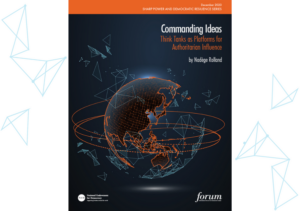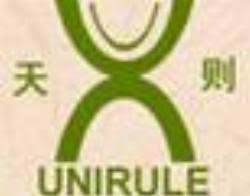 Think tanks first emerged out of a democratic political system that favors freedom of conscience and thought, according to a new analysis. They were designed to generate new ideas, provide objective research and analysis, and consider relevant policymaking questions without government direction. In recent years, however, authoritarians have rapidly grasped the potential value of think tanks as conduits for influence abroad, notes Nadège Rolland, a senior fellow for political and security affairs at the National Bureau of Asian Research (NBR) and nonresident fellow at the Lowy Institute.
Think tanks first emerged out of a democratic political system that favors freedom of conscience and thought, according to a new analysis. They were designed to generate new ideas, provide objective research and analysis, and consider relevant policymaking questions without government direction. In recent years, however, authoritarians have rapidly grasped the potential value of think tanks as conduits for influence abroad, notes Nadège Rolland, a senior fellow for political and security affairs at the National Bureau of Asian Research (NBR) and nonresident fellow at the Lowy Institute.
Unfortunately, some democratic think tanks may be tempted to engage with authoritarian partners because running research institutions is expensive, and funding sources for certain forms of expertise are scarce, she writes in Commanding Ideas: Think Tanks as Platforms for Authoritarian Influence, the latest Sharp Power and Democratic Resilience report from the National Endowment for Democracy’s International Forum for Democratic Studies:
Authoritarian think tanks operate much like their democratic counterparts—organizing public conferences and events, publishing research in academic journals and on their websites, and sharing analyses with media outlets. But the antiliberal and antidemocratic political systems to which these entities belong repress any form of dissent and claim control over the discursive and ideational space. The overall effect lends regime-backed narratives an artificial legitimacy. Democratic think tanks and other civil society stakeholders have a critical role to play in strengthening democratic resilience and countering authoritarian attempts to undermine intellectual freedom.
“Seeking to engineer a perception of global support for their political system and to shape a landscape that will be more favorable to their policies, talking points, and version of the truth, some authoritarian regimes—including those in Russia, China, and the Persian Gulf monarchies—have encouraged the creation of their own national think tanks,” Rolland asserts.
 The report is not just about PRC think tanks but they get a lot of attention, adds Sinocism:
The report is not just about PRC think tanks but they get a lot of attention, adds Sinocism:
Xi Jinping’s rise to power in 2012–2013 marked in many domains an acceleration and clarification of previously observable trends. Think tanks are no exception. At a December 2012 CCP economic work conference, Xi proposed establishing high-quality think tanks to serve policymaking….. Fu Ying, a distinguished Chinese foreign policy practitioner, explained that Chinese think tanks should “adhere to the Party leadership and serve the country” while at the same time being “independent and objective.” In this case, “independence” does not mean free from government control, but rather free from the influence of Western concepts and ideas that the CCP considers threatening and subversive. More autonomous organizations, including the widely respected Unirule Institute of Economics, have since been forced to close down…
![]() Comment: Vice Foreign Minister Le Yucheng gave a speech earlier this month at the “Third China Think Tank International Influence Forum and the Sixth Symposium on New Think Tank Construction”. The December 7 Sinocism carried a long excerpt of his speech.
Comment: Vice Foreign Minister Le Yucheng gave a speech earlier this month at the “Third China Think Tank International Influence Forum and the Sixth Symposium on New Think Tank Construction”. The December 7 Sinocism carried a long excerpt of his speech.
KEY IDEAS
- Democratic think tanks must develop and follow strict codes of conduct when it comes to their relationships with authoritarian actors. They should also be expected to publicly disclose all of their sponsors and corresponding donation amounts, and to commit not to sign any secret agreements.
- Think tanks in open societies should develop a healthy habit of proactive due diligence, searching carefully for any potential conflicts of interest. The correlations among sponsor, research project, and output are not always straightforward.
- Private foundations and philanthropists in democratic countries should prioritize funding for think tanks that abide by strict codes of conduct governing potential relationships with authoritarian-linked entities.
- Think tanks in democratic countries should proactively engage with rising think tank professionals from emerging democracies in Latin America, sub-Saharan Africa, and South and Southeast Asia to offset the draw of authoritarian alternatives.
- The media and civil society groups can play a critical role in raising public awareness and informing and educating broader constituencies about the nature and tactics of authoritarian think tanks—and the risks they pose to independent inquiry.







